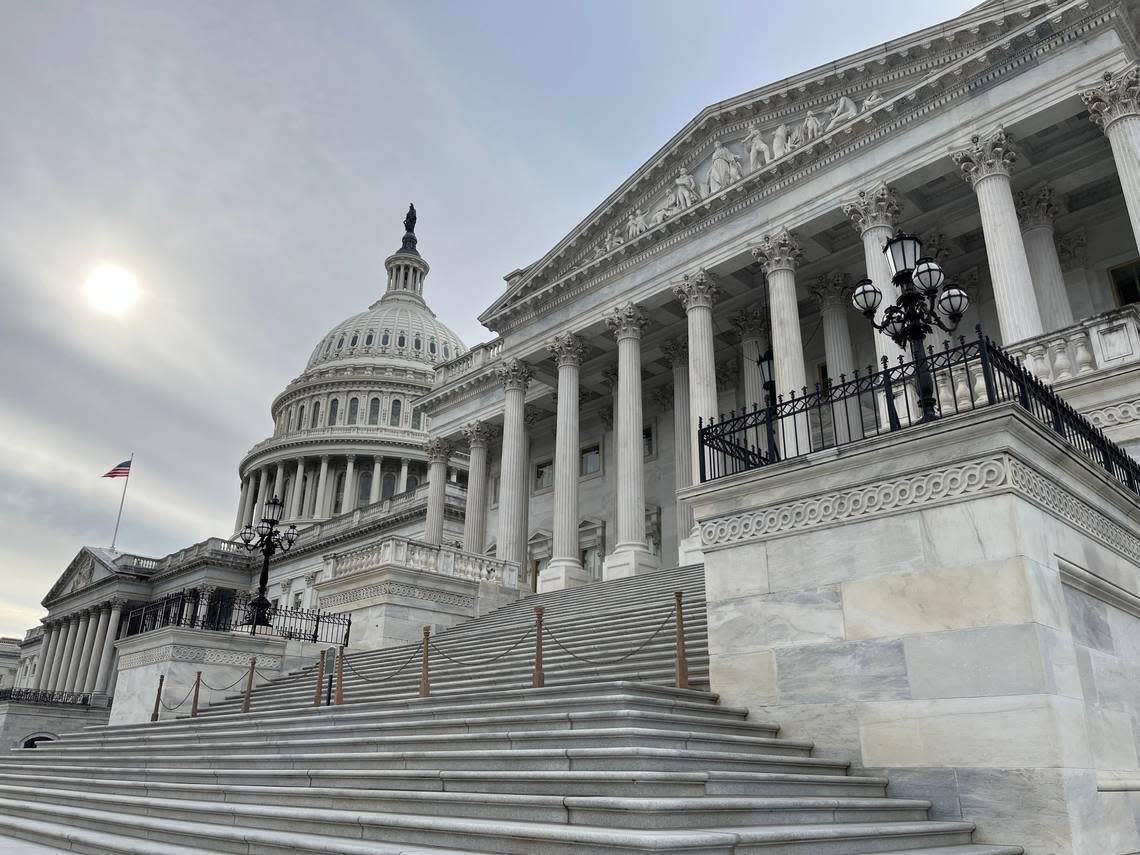House passes bill to expand child tax credit. Here’s how members from KS and MO voted

- Oops!Something went wrong.Please try again later.
- Oops!Something went wrong.Please try again later.
Rep. Sharice Davids’ support for a bipartisan tax bill to expand the child tax credit and tax cuts to businesses was never in doubt.
She was among the 188 Democrats who voted with 169 Republicans in order to pass the legislation on Wednesday night, the latest House bill where the narrow House Republican majority had to rely on Democrats to clear substantive legislation. The bill passed 357-70.
The measure now heads to the Senate, where it has the support of Senate Majority Leader Chuck Schumer, a New York Democrat.
While some Democratic lawmakers were trying to kill the bill for not expanding the child tax credit more, and some Republican lawmakers opposed it for expanding the child tax credit too much, Davids was celebrating.
“I think this is what compromise looks like,” Davids said. “Getting it across the finish line is going to be helpful.”
The overall legislation represents a deal negotiated by Rep. Jason Smith, a Missouri Republican who chairs the House Ways and Means Committee, and Sen. Ron Wyden, an Oregon Democrat who chairs the Senate Finance Committee. In addition to the Child Tax Credit, the bill would enhance the research and development tax credit and allow for more money to go to affordable housing.
Every Kansas representative supported the bill. Missouri’s delegation was split, with Reps. Emanuel Cleaver, a Democrat, and Republicans Mark Alford, Sam Graves, Blaine Luetkemeyer, and Jason Smith, the bill’s sponsor, voting yes. Reps. Cori Bush, a Democrat, and Republicans Eric Burlison and Ann Wagner voted no.
“I would have certainly liked to restore the Child Tax Credit back to the levels in 2021,” Cleaver, of Kansas City, said. “But I’ve always said that democracy demands compromise, and we must be pragmatic when searching for progress.”
The expanded child tax credit is projected to help 136,000 Kansas children and 295,000 Missouri children, according to the Center on Budget and Policy Priorities, a progressive nonprofit that studies taxes. But the proposal falls short of a one-year expansion passed in 2021 that lifted millions of Americans out of poverty.
Under that expansion, the cap on how much someone could receive annually from the child tax credit jumped from $2,000 to $3,600, and included people who didn’t have income. It was also mailed as a monthly check to some people who were eligible.
The more moderate expansion in the House-passed bill allows for increases tied to inflation and lifts the limit on the amount of the tax credit that’s “refundable”, meaning any money beyond what you owe in your taxes.
Rep. Rosa DeLauro, a Connecticut Democrat, has strongly opposed the bill, saying it doesn’t do enough to help the poorest kids in the country. The tax credit does not apply to people who earn less than $2,500 in a year.
While Davids has long pushed for an expansion of the Child Tax Credit, she liked other aspects of the bill as well. In particular, it restores a provision in the Research and Development tax credit for businesses that would allow businesses to deduct research and development expenses, like the wages of researchers or the cost of maintaining research facilities through 2025.
Davids said the bill will help small business entrepreneurs in Kansas invest more in developing products.
“It’s actually one of those ways where main street, regular entrepreneurs and small businesses, actually are able to make use of this program,” Davids said.
The Congressional Budget Office, the non-partisan agency that determines how much legislation would cost, estimates that the bill will cost 31.9 billion between 2024 and 2028. Most of the cost comes from the Research and Development tax credit, with about $1.4 billion in 2025 and 2026 for the child tax credit, before the expansion is phased out.
Most of the bill is balanced out by phasing out a COVID-era tax credit that encouraged businesses to keep employees on their payroll.
While lawmakers say the bill will allow for states to offer more money for the Low-Income Housing Tax Credit, a public-private partnership that incentivizes more housing, Davids pushed for a larger expansion of the credit.
Davids and Rep. Jake LaTurner, a Kansas Republican, sent a letter to House Speaker Mike Johnson, a Louisiana Republican, asking him to consider a vote on a bill that would create a broader expansion of the Low-Income Housing Tax Credit, in part by allowing private companies to get bonds to build affordable housing projects.
How they voted
A yes vote means the lawmaker supported the tax bill.
Kansas
Rep. Sharice Davids (D) — yes
Rep. Ron Estes (R) — yes
Rep. Jake LaTurner (R) — yes
Rep. Tracey Mann (R) — yes
Missouri
Rep. Mark Alford (R) — yes
Rep. Eric Burlison (R) — no
Rep. Cori Bush (D) — no
Rep. Emanuel Cleaver (D) — yes
Rep. Sam Graves (R) — yes
Rep. Blaine Luetkemeyer (R) — yes
Rep. Jason Smith (R) — yes
Rep. Ann Wagner (R) — no

